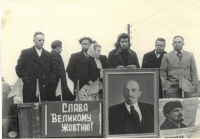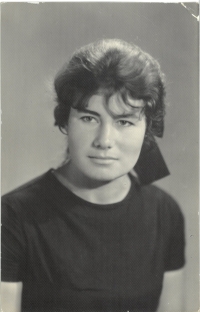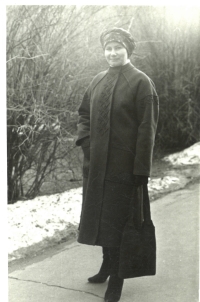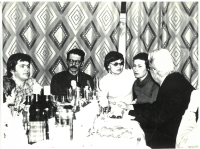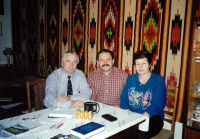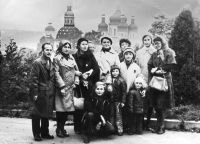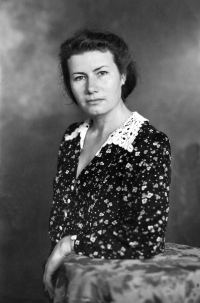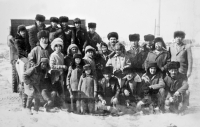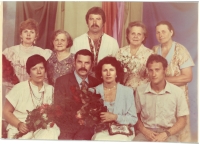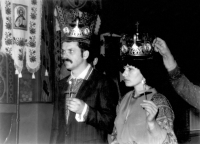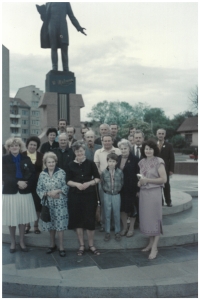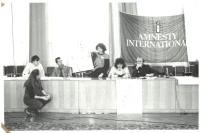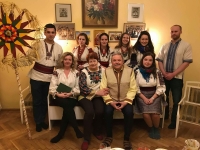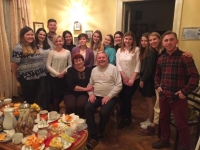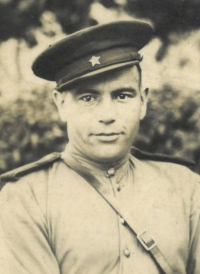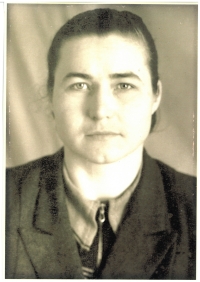“At the nearby publishing house “Soviet School” they were going on a tourist trip to Poltava. The head of our editorial office - Nila Yakivna Kucheriavenko, a kind, intelligent woman, a wise woman, me and another proofreader, Nadia (she is my former student whom I... she had difficult circumstances in her life, I called her to Kyiv, I found her the job in the proofreading office ), so the three of us joined this trip.
I saw a very interesting picture near the bus: three men in serdaks. Can you imagine what it is? <…> This is such folk clothing, such short, knee-length, with patterns, such a folk cut. Three young guys in these Ukrainian serdaks, with mustaches, two with black mustaches and one with a red beard, and two girls, ordinary looking girls. On the way, when we were driving, they were singing wonderful rare Ukrainian songs. And when they heard that Nadia and I spoke Ukrainian, they invited us to sing them too. But what did we know then? What was played on the radio in Soviet times? “Halia is Carrying the Water” or “The Thorn Bush is in Bloom” and so on. We didn't know other songs - we just listened. Then there was a stop, they arranged interesting games. Poltava, you know how they sing in the song, even though it was October, it was “snow on a green leaf”, you know, there is such a song. This is how Poltava was. We were there in the museums of Volodymyr Korolenko, Panas Myrnyi, in the museum of the Battle of Poltava. And when we returned, the boys suggested that I join them, learn carols and go caroling. I was so interested in it, the guys were very handsome... And I agreed, started going with them. I told Mykhailyna Khomivna that I have some new acquaintances. And she said: “Oh, I know them.” Mykola and Myroslav - Mykola Matusevych and Myroslav Marynovych, and the third guy there was Mykola Netiaha. These guys - Myroslav and Mykola - they live in a small house opposite the house where she lives, and she feels very comfortable in their loose young company. So, I started going to the apartment of twins Olha and Pavlo Stokotelni <...>. And the girls were Olia Heiko and Liuda Savchenko. And Liuda Savchenko, who was a member of Leopold Yashchenko's Ukrainian choir, an amateur choir that the authorities later accused of Ukrainian bourgeois nationalism, and she taught us carols and nativity scenes with us at these twins’ house, at Skotelni. I liked it so much that I said: “Liudo, come to our publishing house.” Because I also wanted to stage this nativity scene in our publishing house. And Liuda came, and we learned, we had one rehearsal.
But all this, as it turned out, “was not allowed.” And how I found out about that. Our head of the personnel department in the morning of the day when we were supposed to go caroling... the head of the personnel department, a former officer, called me, and when I came, I saw that a strange man in civilian clothes was sitting there. Then the head of the department came out, and the man said that he was from the security service, that my new acquaintances, whom they knew, were anti-Soviet and dangerous people. I don't remember what else he said there, but I remember that I promised him that I wouldn't go caroling. I returned home so confused, very upset, it was hard on my soul. And in the end, I decided to protest and went to join the group. Then there I was dressed in the serdak of Alla Horska.
Alla Horska... Mykhasia [Mykhailyna Kotsiubynska] told me about her - she was a monumentalist artist who lived with her father in the Crimea, spoke Russian, but then an amazing miracle happened to her. She switched to the Ukrainian language, she had such a trait... she gathered around herself the whole conscious Kyiv Ukrainian society and was its soul. And so Mykhasia told me how Alla Horska once came to her. The doorbell rings, she opens the door - Alla Horska in that Ukrainian serdak with a bunch of onions around her neck, with a bag of red-sided apples at her feet, blond hair blown by a whirlwind... She was the one delivering to her friends from Kyiv the salary that was given to her in some collective farms or state farms for her work as a monumentalist artist. But I have only heard about these people - Vasyl Stus and Alla Horska - but I have not seen them. Because when I found out about them, Vasyl Stus was already fulfilling his martyrdom in the camps, concentration camps, and Alla Horska was lying in the raw earth, killed by the dark KGB force.”

